不规则动词过去式和过去分词及其练习
动词过去式、过去分词不规则变化

动词过去式、过去分词不规则变化一. AAA型(原形→原形→原形)原形过去式过去分词汉语意思read read read读cut cut cut切,割let let let让put put put放cost cost cost花费,值hit hit hit撞,击set set set安排,安置hurt hurt hurt使…伤痛bet bet bet赌博,打赌cast cast cast抛二. ABA型(原形→过去式→原形)三. ABC型1. ow →ew →ownblow blew blown吹draw drew drawn画grow grew grown生长know knew known 知道2. i→a →u原形过去式过去分词汉语意思begin began begun开始drink drank drunk喝sing sang sung唱swim swam swum游泳ring rang rung打电话3. 原形→过去式→过去式+(e)n原形过去式过去分词汉语意思wear wore worn穿forget forgot forgotten忘记speak spoke spoken说freeze froze frozen冻choose chose chosen选择drive drove driven驾驶mistake mistook mistaken误解rise rose risen上升shake shook shaken摇4. 原形→过去式→原形+(e)neat ate eaten吃forbid forbade fo r b idden禁止give gave given给ride rode ridden骑see saw seen看见write wrote written写fall fell fallen落下break broke broken打破,折断forgive forgave forgiven原谅;宽恕5. 无规律原形过去式过去分词汉语意思am/is was been是are were been是do did done做go went gone走take took taken拿四. ABB型think thought thought思考seek sought sought寻求2. 原形→aught →aught原形过去式过去分词汉语意思catch caught caught捉,抓teach taught taught教3. 变其中一个元音字母原形过去式过去分词汉语意思feed fed fed喂meet met met遇见get got got得到hold held held拥有babysit babysat babysat临时照看sit sat sat坐win won won赢find found found发现bend bent bent使弯曲dig dug dug挖lead led led引导sell sold sold卖4. 原形→□t→□t原形过去式过去分词汉语意思feel felt felt感到keep kept kept保持leave left left离开sleep slept slept睡sweep swept swept扫smell smelt smelt闻;发出气味retell retold retold复述5. 变其中一个辅音字母原形过去式过去分词汉语意思build built built建造hear heard heard听见make made made制造mean meant meant意思send sent sent送,寄spend spent spent花费deal dealt dealt处理rebuild rebuilt rebuilt重建lend lent lent借贷6.辅音字母和元音字母都变原形过去式过去分词汉语意思have had had有,吃lay laid laid放置,产卵lose lost lost丢失pay paid paid付钱say said said说sell sold sold卖tell told told告诉stand stood stood站misunderstand misunderstood misunderstood误解shoot shot shot放炮;开枪understand understood understood理解五. AAB型六. 有两种形式七. 情态动词原形过去式过去分词汉语意思can could∕能may might∕也许must∕∕必须shall should∕将要will would∕会。
人教版初中八年级不规则动词过去式与过去分词总结练习汇编

is
bear
beat
become
begin
blow
break
bring
build
burn
buy
catch
choose
come
cost
cut
dig
do
does
draw
dream
drink
drive
eat
fall
feed
原形
过去式
过去分词
意思
feel
fight
find
fly
forget
get
give
原形
经常光顾□偶尔会去□不会去□
据上述部分的分析可见,我校学生就达4000多人。附近还有两所学校,和一些居民楼。随着生活水平的逐渐提高,家长给孩子的零用钱也越来越多,人们对美的要求也越来越高,特别是大学生。他们总希望自己的无论是衣服还是首饰都希望与众不同,能穿出自己的个性。但在我们美丽的校园里缺少自己的个性和琳琅满目的饰品,所以我们的小饰品店存在的竞争力主要是南桥或是市区的。这给我们小组的创业项目提供了一个很好的市场机会。9、如果你亲戚朋友送你一件DIY手工艺制品你是否会喜欢?过去式
set
send
set
shake
shine
show
shut
sing
sit
原形
过去式
过去分词
意思
sleep
smell
speak
speed
spend
spread
stand
steal
stick
swim
take
teach
tell
think
throw
英语不规则动词过去式和过去分词表
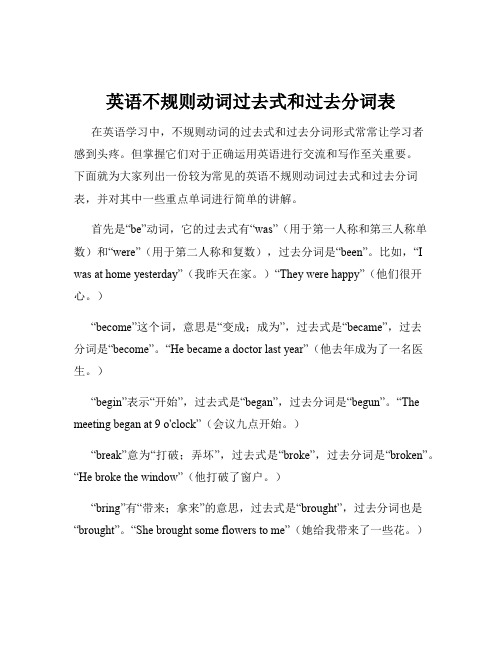
英语不规则动词过去式和过去分词表在英语学习中,不规则动词的过去式和过去分词形式常常让学习者感到头疼。
但掌握它们对于正确运用英语进行交流和写作至关重要。
下面就为大家列出一份较为常见的英语不规则动词过去式和过去分词表,并对其中一些重点单词进行简单的讲解。
首先是“be”动词,它的过去式有“was”(用于第一人称和第三人称单数)和“were”(用于第二人称和复数),过去分词是“been”。
比如,“I was at home yesterday”(我昨天在家。
)“They were happy”(他们很开心。
)“become”这个词,意思是“变成;成为”,过去式是“became”,过去分词是“become”。
“He became a doctor last year”(他去年成为了一名医生。
)“begin”表示“开始”,过去式是“began”,过去分词是“begun”。
“The meeting began at 9 o'clock”(会议九点开始。
)“break”意为“打破;弄坏”,过去式是“broke”,过去分词是“broken”。
“He broke the window”(他打破了窗户。
)“bring”有“带来;拿来”的意思,过去式是“brought”,过去分词也是“brought”。
“She brought some flowers to me”(她给我带来了一些花。
)“build”,“建造;建筑”,过去式是“built”,过去分词同样是“built”。
“They built a new house last month”(他们上个月建了一座新房子。
)“buy”表示“买”,过去式是“bought”,过去分词还是“bought”。
“I bought a book yest erday”(我昨天买了一本书。
)“catch”,“抓住;接住”,过去式是“caught”,过去分词为“caught”。
“The policeman caught the thief”(警察抓住了小偷。
英语动词变过去式、过去分词不规则变化大全
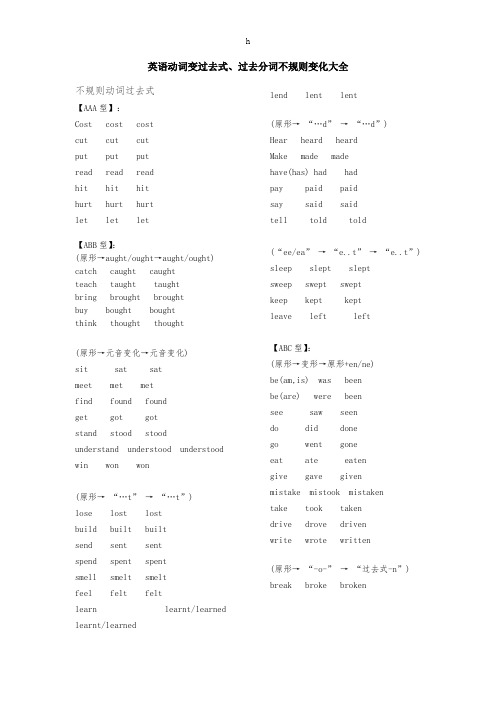
英语动词变过去式、过去分词不规则变化大全不规则动词过去式【AAA型】:Cost cost costcut cut cutput put putread read readhit hit hithurt hurt hurtlet let let【ABB型】:(原形→aught/ought→aught/ought) catch caught caughtteach taught taughtbring brought broughtbuy bought boughtthink thought thought(原形→元音变化→元音变化)sit sat satmeet met metfind found foundget got gotstand stood stoodunderstand understood understood win won won(原形→ “…t” → “…t”)lose lost lostbuild built builtsend sent sentspend spent spentsmell smelt smeltfeel felt feltlearn learnt/learned learnt/learned lend lent lent(原形→ “…d” → “…d”)Hear heard heardMake made madehave(has) had hadpay paid paidsay said saidtell told told(“ee/ea” → “e..t” → “e..t”) sleep slept sleptsweep swept sweptkeep kept keptleave left left【ABC型】:(原形→变形→原形+en/ne)be(am,is) was beenbe(are) were beensee saw seendo did donego went goneeat ate eatengive gave givenmistake mistook mistakentake took takendrive drove drivenwrite wrote written(原形→ “-o-” → “过去式-n”) break broke brokenspeak spoke spokenforget forgot forgotten(原形→ “ew” → “原形-n”) show showed shownfly flew flowngrow grew grownthrow threw thrownknow knew known(原形→ “-a-” → “-u-”) Begin began begunring rang rungdrink drank drunksing sang sungswim swam swum【ABA型】become became becomecome came comerun ran run【AB型】(无过去分词)May mightMust mustcan couldshall shouldwill would欢迎您的下载,资料仅供参考!。
小学常见不规则动词过去式及过去分词的巩固训练
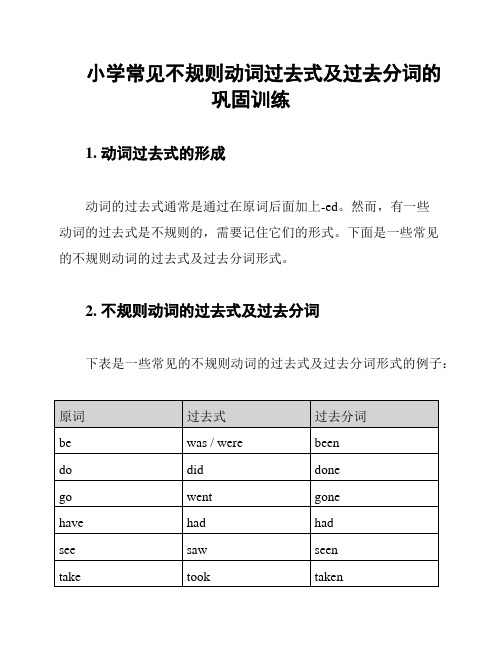
小学常见不规则动词过去式及过去分词的巩固训练1. 动词过去式的形成动词的过去式通常是通过在原词后面加上-ed。
然而,有一些动词的过去式是不规则的,需要记住它们的形式。
下面是一些常见的不规则动词的过去式及过去分词形式。
2. 不规则动词的过去式及过去分词下表是一些常见的不规则动词的过去式及过去分词形式的例子:3. 练题下面是一些练题,帮助你巩固不规则动词的过去式及过去分词形式的记忆。
1. 请用动词的过去式填空:- I ___ to the park yesterday. (go)- They ___ a great time at the party. (have)- She ___ a picture of the beautiful sunset. (take)2. 请用动词的过去分词形式填空:- The book has been ___ by many people. (read)- We had ___ our homework before dinner. (finish)- The cake was ___ by the children. (eat)3. 请用适当的动词形式填空:- He ___ his father at the airport last week. (meet)- The dog has ___ its bone. (hide)- They ___ soccer in the park yesterday. (play)4. 答案1. 请用动词的过去式填空:- I went to the park yesterday. (go)- They had a great time at the party. (have)- She took a picture of the beautiful sunset. (take)2. 请用动词的过去分词形式填空:- The book has been read by many people. (read)- We had finished our homework before dinner. (finish)- The cake was eaten by the children. (eat)3. 请用适当的动词形式填空:- He met his father at the airport last week. (meet)- The dog has hidden its bone. (hide)- They played soccer in the park yesterday. (play)希望这份文档对你巩固不规则动词的过去式及过去分词有所帮助!。
动词过去式和过去分词的变化规则练习及答案
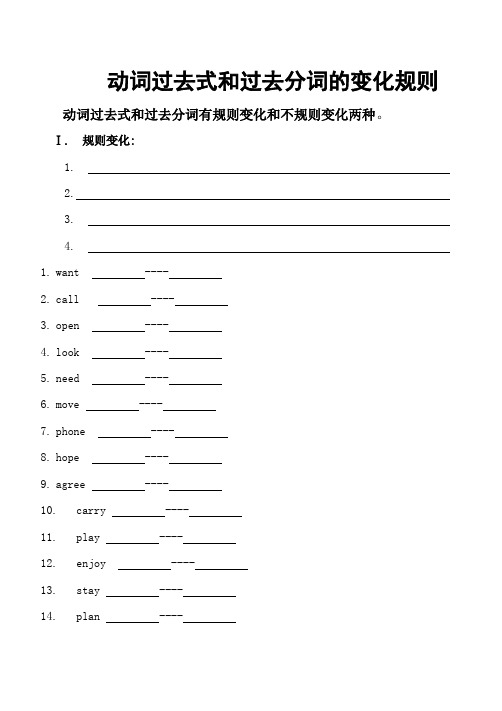
动词过去式和过去分词的变化规则动词过去式和过去分词有规则变化和不规则变化两种。
Ⅰ. 规则变化:1.2.3.4.1.want ----2.call ----3.open ----4.look ----5.need ----6.move ----7.phone ----8.hope ----9.agree ----10.carry ----11.play ----12.enjoy ----13.stay ----14.plan ----15.fit ----16.refer ----II. 不规则动词表:(1) AAA型(动词原形、过去式、过去分词同形)cost(花费) ----cut(割) ----hit(打) ----let(让) ----shut ----spit ----hurt 伤害) ----put(放) ----read (读) ----(2) AAB型(动词原形与过去式同形)beat(跳动) ----(3) ABA型(动词原形与过去分词同形)become(变成) ---- come(来) ----run(跑) ----(4) ABB型(过去式与过去分词同形)dig(挖) ---- get(得到) ----catch ---- hang(吊死 ---- deal ----hang(悬挂) ---- feed ---- hold(抓住) ---- find ---- shine(照耀) ---- forbid ----sit(坐) ---- pay ----win (赢) ---- send ---- meet(遇见) ---- shoot ---- keep (保持) ---- sleep(睡) ---- sweep(扫) ---- feel(感觉) ---- smell(闻) ---- leave(离开) ---- build(建设) ----lend(借出) ---- send (传送) ---- spend(花费) ---- lose (丢失) ---- burn (燃烧) ---- learn(学习) ---- mean(意思是) ---- catch(抓住) ---- teach(教) ---- bring(带来) ---- fight (战斗) ---- buy(买) ----think(想) ----hear (听见) ----sell(卖) ---- tell(告诉) ----say(说) ---- find(找到) ---- have/has(有) ---- make(制造) ---- stand(站) ---- understand明白 ----(5) ABC型(动词原形、过去式与过去分词三者不同形)begin(开始) ---- take(取) ----drink(喝) ---- mistake(弄错) ---- ring(铃响) ----ride(骑) ----sing (唱) ---- do(做) ----swim(游泳) ---- write(写) ----blow(吹) ----go(去) ----draw (画) ----lie(平躺) ----fly(飞) ----see(看见) ----grow(生长) ----wear (穿) ----know(知道) ----be ( am, is, are )(是) ----throw(投掷) ----can---- may---show(出示) ----break(打破) ----choose(选择) ----forget(忘记) ----bear ----speak(说,讲) ----draw ----wake(醒) ----dream ----drive(驾驶) ----hide ----eat(吃) ----lay(放置) ----fall(落下) ----lie(撒谎) ----give(给) ----lie(躺) ----rise(升高) ----see ----shake ---- stealshall---will---动词过去式和过去分词的变化规则动词过去式和过去分词有规则变化和不规则变化两种。
小学常见不规则动词过去式及过去分词的练习
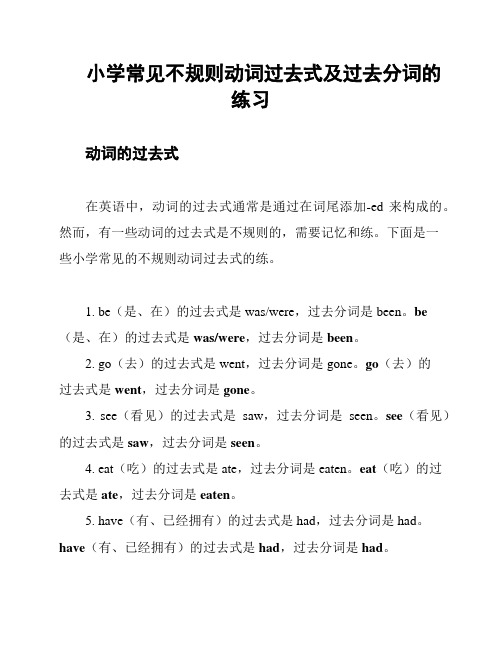
小学常见不规则动词过去式及过去分词的练习动词的过去式在英语中,动词的过去式通常是通过在词尾添加-ed来构成的。
然而,有一些动词的过去式是不规则的,需要记忆和练。
下面是一些小学常见的不规则动词过去式的练。
1. be(是、在)的过去式是was/were,过去分词是been。
be (是、在)的过去式是was/were,过去分词是been。
2. go(去)的过去式是went,过去分词是gone。
go(去)的过去式是went,过去分词是gone。
3. see(看见)的过去式是saw,过去分词是seen。
see(看见)的过去式是saw,过去分词是seen。
4. eat(吃)的过去式是ate,过去分词是eaten。
eat(吃)的过去式是ate,过去分词是eaten。
5. have(有、已经拥有)的过去式是had,过去分词是had。
have(有、已经拥有)的过去式是had,过去分词是had。
6. do(做)的过去式是did,过去分词是done。
do(做)的过去式是did,过去分词是done。
7. say(说)的过去式是said,过去分词是said。
say(说)的过去式是said,过去分词是said。
8. get(获得)的过去式是got,过去分词是got/gotten。
get (获得)的过去式是got,过去分词是got/gotten。
9. make(做、制作)的过去式是made,过去分词是made。
make(做、制作)的过去式是made,过去分词是made。
10. find(找到)的过去式是found,过去分词是found。
find (找到)的过去式是found,过去分词是found。
动词的过去分词动词的过去分词通常用于完成时态和被动语态。
下面是一些小学常见的动词过去分词的练。
1. write(写)的过去分词是written。
write(写)的过去分词是written。
2. read(读)的过去分词是read。
read(读)的过去分词是read。
不规则动词过去式、过去分词(练习)
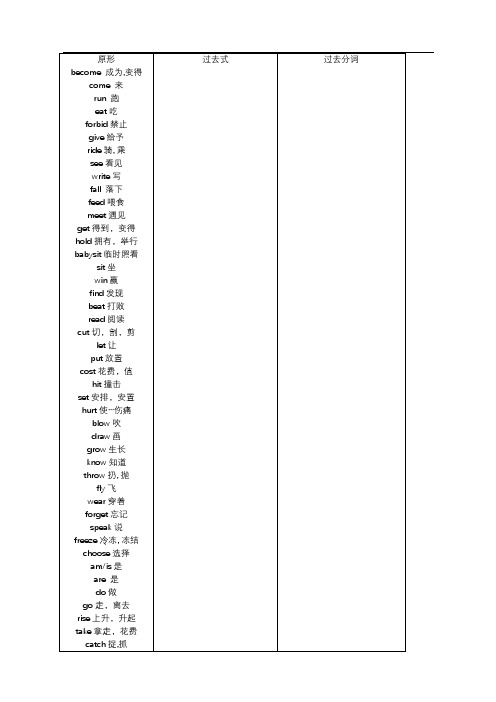
hit撞击
set安排,安置
hurt使…伤痛
blow吹
draw画
grow生长
know知道
throw扔, 抛
flห้องสมุดไป่ตู้飞
wear穿着
forget忘记
speak说
freeze冷冻, 冻结
choose选择
am/is是
are是
do做
go走,离去
rise上升,升起
take拿走,花费
catch捉,抓
teach教
feel感到,触摸
keep保持
leave离开
sleep睡觉
sweep扫地
have有,吃
lay置放
lose丢失
pay付钱
say说
sell销售
tell告诉
stand站立,忍受
understand理解
bear生
hang吊死
悬挂
learn学习
lie说谎,
躺下,位于
show展示
spell拼写
burn烧
smell闻,嗅
shine照耀
dream梦想
wake醒来
bring带来
buy买
fight打架
think想起,认为
begin开始
drink喝
sing唱
swim游泳
ring响起
build建造
hear听见
make制造
mean意思
send送,寄
spend花费
deal处理
过去式
过去分词
原形
become 成为,变得
come 来
run 跑
eat吃
forbid禁止
不规则动词过去式过去分词

2. 把动词原形中o改为e变成过去式, 在原形词尾加n变成过去分词. blow--blew--blown grow--grew--grown know--knew--known throw -- threw -- thrown fly --flew /flu:/ --flown ( 和以上相似) 3. 以下动词的过去分词都以en结尾, 故把它们分为一类. a ) 把动词原形中i改为o变成过去式, 在词尾加n变成过去分词. drive--drove--driven rise--rose--risen write--wrote--written (双写t ) ride--rode--ridden (双写d )
C.原型与过去分词相同 come--came--come run--ran--run become--became--become D. 原形,过去式, 和 过去分词完全不同 1. 把动词原形中i改为a变成过去式, 改成u变成过去分词. begin -- began --begun drink--drank--drunk ring--rang--rung swim--swam--swum sing--sang--sung
9.动词原形中的ell改为old,变成过去式。如: sell—sold--sold,tell—told---told 10.以ought和aught结尾, 且读音是[ :t]的过去式。如: bring—brought--brought, buy—bought--bought, think—thought--thought, catch—caught---caught, teach—taught--taught 11.以ould结尾且读音为[ud]的情态动词过去式。 如: can—could, shall—should, will—would
(完整版)初中英语常用不规则动词的过去式与过去分词
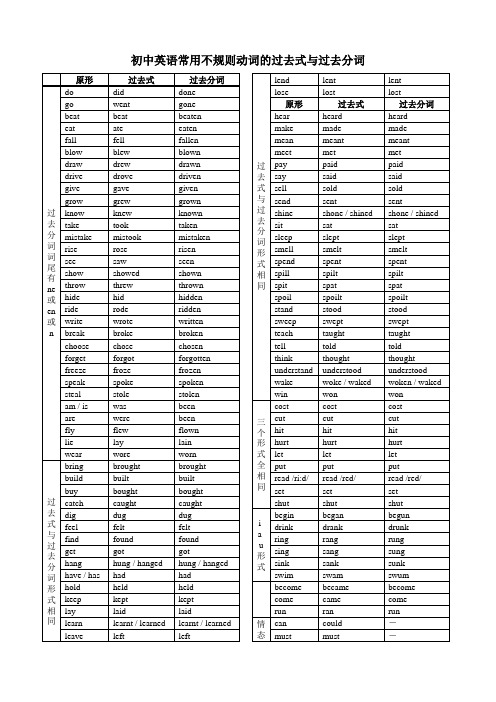
初中英语常用不规则动词的过去式与过去分词初中英语不规则动词的过去式与过去分词归纳一.过去分词词尾有字母-n1.过去分词由原形加-ne构成do-did-done go-went-gone2.过去分词由原形加-en构成beat-beat-beaten eat-ate-eaten fall-fell-fallen3.过去分词由原形加-n构成blow-blew-blown draw-drew-drawn drive-drove-drivengive-gave-given grow-grew-grown know-knew-known take-took-taken mistake-mistook-mistaken rise-rose-risen see-saw-seenshow-showed-shown throw-threw-thrown4.过去分词由原形去字母e后,再双写后面的辅音字母加-en构成(*例外)hide-hid-hidden ride-rode-ridden write-wrote-writtenforget-forgot-forgotten*5.过去分词由过去式加-n构成break-broke-broken choose-chose-chosen freeze-froze-frozenspeak-spoke-spoken steal-stole-stolen6.完全不规则形式am / is-was-been are-were-been fly-flew-flown lie-lay-lain wear-wore-worn二.过去式与过去分词形式相同bring-brought-brought build-built-built buy-bought-boughtcatch-caught-caughtdig-dug-dug feel-felt-felt find-found-found get-got-got have / has-had-had hold-held-held keep-kept-kept leave-left-leftlay-laid-laid lend-lent-lent lose-lost-lostpay-paid-paidhear-heard -heard make-made-made mean-meant-meantmeet-met-metsay-said-said sell-sold-sold send-sent-sent sit-sat-sat sleep-slept-slept smell-smelt-smelt spend-spent-spentspill-spilt-spiltspit-spat-spat spoil-spoilt-spoilt stand-stood-stoodsweep-swept-sweptteach-taught-taught tell-told-told think-thought-thoughtwin-won-wonunderstand-understood-understood wake-woke / waked-woken / wakedshine-shone / shined-shone / shined hang-hung / hanged-hung / hangedlearn-learnt / learned-learnt / learned三.原形、过去式与过去分词三种形式完全相同cost-cost-cost cut-cut-cut hit-hit-hit hurt-hurt-hurt let-let-let put-put-put set-set-setshut-shut-shutread /ri:d/-read /red/-read /red/四.i-a-u变化形式begin-began-begun drink-drank-drunk ring-rang-rungsing-sang-sungsink-sank-sunk swim-swam-swum五.过去分词与原形相同come-came-come run-ran-run become-became-become六.情态动词(没有过去分词形式)can-could must-must will-would may-might shall-should。
大学英语不规则动词的过去式、过去分词

动词原形过去式过去分词意思abide abode/abided abode/abided持续;忍受;停留alight alighted/alit alighted/alit下来;飞落arise arose arisen出现;上升;起立awake awoke/awaked awoken/awoke/awaked唤醒;使觉醒;激起,唤起am was been 是;有,存在;做,成为;发生is was been 是;有,存在;做,成为;发生are were been 是;有,存在;做,成为;发生bear bore borne/born忍受;承受;具有;支撑beat beat beaten 拍子;敲击;有规律的一连串敲打become became become成为;变得;变成befall befell befallen降临;发生begin began begun开始;首先behold beheld beheld看;注视;把视为bend bent bent 使弯曲;使屈服;使致力;使朝向beset beset beset困扰;镶嵌;围绕bet bet/betted bet/betted打赌,赌注;敢断定bid bade/bid bidden/bid出价;叫牌;努力争取bide bode/bided bided等待;面临;禁得起bind bound bound 捆绑;困境;讨厌的事情;植物的藤蔓bite bit bitten/bit咬;咬伤;刺痛bleed bled bled 使出血;榨取/流血;渗出;悲痛blend blended/blent blended/blent混合;协调bless blessed/blest blessed/blest祝福;保佑;赞美blow blew blown吹;打击;殴打break broke broken打破;折断;弄坏;削弱breed bred bred 繁殖;饲养;养育,教育;引起bring brought brought 带来;促使;引起;某人处于某种情况或境地broadcast broadcast/broadcasted broadcast/broadcasted 播送,播放;(无线电或电视)广播;播撒(种子)build built built建筑;建造burn burnt/burned burnt/burned 燃烧;烧毁,灼伤;激起的愤怒burst burst burst爆发,突发;爆炸buy bought bought购买;获得;贿赂can could-能;能够;可以;可能cast cast cast 投,抛;计算;浇铸;投射(光、影、视线等)catch caught caught赶上;抓住;感染;了解choose chose chosen选择,决定cling clung clung坚持,墨守;紧贴;附着clothe clothed/clad clothed/clad给穿衣;覆盖;赋予come came come 来;开始;出现;发生;变成;到达cost cost cost花费;使付出;使花许多钱cut cut cut[机]切割;削减;缩短;刺痛dare dared dared/durst敢;胆敢deal dealt dealt处理;给予;分配;发牌die died died死亡;凋零;熄灭dig dug dug挖,掘;探究dispread dispread dispread向四方张开;展开do/does did done 做;工作;有用(do的第三人称单数形式)draw drew drawn拉;拖dream dreamed/dreamt dreamed/dreamt梦想;做梦;想到drink drank drunk喝,饮;吸收;举杯庆贺drive drove driven vt. 推动,发动(机器等);驾驶(马车,汽车等);驱赶dwell dwelt dwelt居住;存在于;细想某事eat ate eaten吃,喝;腐蚀;烦扰fall fell fallen落下;变成;来临;减弱feed fed fed喂养;供给;放牧;抚养(家庭等);靠为生feel felt felt觉得;摸索fight fought fought 打架;与打仗,与斗争;反对提案find found found 查找,找到;发现;认为;感到;获得flee fled fled逃走;消失,消散fly flew flown飞;驾驶飞机;飘扬flee fled fled逃走(flee的过去分词);消逝forbear forbore forborne忍耐;克制forbid forbade/forbad forbidden 禁止;不准;不允许;〈正式〉严禁forecast forecast/forecasted forecast/forecasted预报,预测;预示forego forewent foregone放弃;居先;在之前foreknow foreknew foreknown预见;预知;先知foresee foresaw foreseen预见;预知forget forgot forgotten/forgot忘记;忽略forgive forgave forgiven原谅;免除(债务、义务等)forsake forsook forsaken放弃;断念forswear forswore forsworn发誓抛弃freeze froze frozen使冻住;使结冰get got got/gotten使得;获得;受到;变成gild gilded/gilt gilded/gilt镀金;虚饰;供给钱gird girded/girt girded/girt束缚;佩带;做准备give gave given给;产生;让步;举办;授予go went gone去;进行;尝试grave graved graven/graved雕刻;铭记grind ground ground磨碎;磨快grow grew grown使生长;种植;扩展hang hung hung 悬着,垂下;被绞死;悬而不决hang hanged hanged 悬挂,垂下;装饰;绞死;使悬而未决have had had有;让;拿;从事;允许hear heard heard听到,听;听说;审理heave heaved/hove heaved/hove 举起;使起伏;投掷;恶心;发出(叹息等)hew hewed hewed/hewn劈;砍倒hide hid hidden/hid隐藏;隐瞒;鞭打hit hit hit 打击;袭击;碰撞;偶然发现;伤的感情hold held held 持有;拥有;保存;拘留;约束或控制hurt hurt hurt 使受伤;损害;使疼痛;使痛心keep kept kept保持;经营;遵守;饲养kneel knelt/kneeled knelt/kneeled跪下,跪knit knitted/knit knitted/knit编织;结合know knew known知道;认识;懂得lade laded laded/laden装载;装(船)lay laid laid 躺下;产卵;搁放;放置;铺放;涂,敷lead led led领导;致使;引导;指挥lean leaned/leant leaned/leant使倾斜leap leapt/leaped leapt/leaped跳跃,跳过;使跃过learn learnt/learned learnt/learned学习;得知;认识到leave left left离开;留下;遗忘;委托lend lent lent贷;增添,提供;把借给let let let允许,让;出租;假设;妨碍lie lay lain 躺下;产卵;搁放;放置;铺放;涂,敷lie lied lied谎骗light lit lit照亮;点燃;着火light lighted lighted照亮;点燃;着火lose lost lost 浪费;使沉溺于;使迷路;遗失;错过make made made 使得;进行;布置,准备,整理;制造;认为;获得;形成;安排;引起;构成may might might 可以,能够;可能,也许;祝,愿;会,能mean meant meant意味;想要;意欲meet met met满足;遇见;对付melt melted melted/melten 使融化;使熔化;使软化;使感动mislead misled misled误导;带错mistake mistook mistaken弄错;误解misunderstand misunderstood misunderstood误解;误会must must must 必须,一定;可以,应当;很可能ought ought ought应该,应当;大概overcome overcame overcome克服;胜过pay paid paid支付,付;偿还,补偿;给予precast precast precast预制;预浇制prove proved proved/proven证明;检验;显示put put put表达;移动;安置;赋予quit quitted/quit quitted/quit 离开;放弃;停止;使解除read read read阅读;读懂,理解rebuild rebuilt rebuilt重建;改造,重新组装;复原rend rent rent撕碎;分裂;强夺repay repaid repaid回报;报复;付还reset reset reset重置;重新设定;重新组合retell retold retold复述;再讲;重述rid rid/ridded rid/ridded使摆脱;使去掉ride rode ridden 骑;乘;控制;(骑马、自行车等)穿越;搭乘;飘浮ring rang rung按铃;包围;敲钟;套住rise rose risen使飞起;使浮上水面run ran run管理,经营;运行;参赛saw sawed sawn/sawed锯;锯成;锯say said said 讲;说明;例如;声称;假设;指明see saw seen看见;理解;领会seek sought sought寻求;寻找;探索;搜索sell sold sold销售;推销;出卖;欺骗send sent sent 发送,寄;派遣;使进入;发射set set set树立;点燃;点缀sew sewed sewn/sewed缝合,缝上;缝纫shake shook shaken动摇;摇动;震动;握手shall should-应;会;将;必须shave shaved shaved/shaven 剃,削去;修剪;切成薄片;掠shear sheared shorn/sheared剪;修剪;剥夺shed shed shed流出;摆脱;散发;倾吐shine shone/shined shone/shined照射,擦亮;把的光投向;(口)通过擦拭使变得有shoe shod/shoed shodden给穿上鞋;穿鞋shoot shot shot 射击,射中;拍摄;发芽;使爆炸;给注射show showed shown/showed显示;说明;演出;展出shrink shrank/shrunk shrunk/shrunken使缩小,使收缩shut shut shut关闭;停业;幽禁sing sang/sung sung唱;用诗赞颂;唱着使sink sank/sunk sunk/sunken使下沉;挖掘;使低落sit sat sat使就座slay slew slain杀害,杀死;使禁不住大笑sleep slept slept睡,睡觉slide slid slid 滑动;使滑动;悄悄地迅速放置sling slung slung用投石器投掷;吊起smell smelt/smelled smelt/smelled 嗅,闻;察觉到;发出的气味sow sowed sown/sowed播种;散布;使密布speak spoke spoken讲话;发言;讲演speed sped/speeded sped/speeded 加快的速度;使成功,使繁荣spell spelt/spelled spelt/spelled 拼,拼写;意味着;招致;拼成;迷住;轮值spend spent spent度过,消磨(时光);花费;spill spilt/spilled spilt/spilled使溢出,使流出;使摔下spin spun spun使旋转;纺纱;编造;结网spit spat/spit spat/spit吐,吐出;发出;发射split split split 分离;使分离;劈开;离开;分解spoil spoilt/spoiled spoilt/spoiled溺爱;糟蹋;破坏;掠夺spread spread spread 传播,散布;展开;伸展;铺开spring sprang/sprung sprung 使跳起;使爆炸;突然提出;使弹开stand stood stood使站立;忍受;抵抗steal stole stolen剽窃;偷偷地做;偷窃stick stuck stuck刺,戳;伸出;粘贴sting stung stung 刺;驱使;使苦恼;使疼痛stink stank/stunk stunk使发出臭气;用臭味驱赶stride strode stridden 跨过;大踏步走过;跨坐在strike struck struck/stricken 打,击;罢工;撞击,冲击;侵袭;打动;到达string strung strung线,弦,细绳;一串,一行strive strove/strived striven/strived努力;奋斗;抗争swear swore sworn发誓;咒骂sweat sweat/sweated sweat/sweated 使出汗;流出;使干苦活;剥削;藉出汗减轻;焦急地期待sweep swept swept扫除;猛拉;掸去swell swelled swollen/swelled使膨胀;使隆起swim swam swum游过;使浮起swing swung swung使旋转;挥舞;悬挂take took taken 拿,取;采取;接受(礼物等);买,花费;耗费(时间等)teach taught taught教;教授;教导tear tore torn撕掉/扯下/扰乱tell told told告诉,说;辨别;吩咐;断定think thought thought想;认为;想起;想象;打算thrive throve/thrived thriven/thrived繁荣,兴旺;茁壮成长throw threw thrown投;抛;掷thrust thrust thrust插;插入;推挤tread trod trodden/trod踏;踩;践踏;跳;踩出underdo underdid underdone不尽全力做;使煮得嫩undergo underwent undergone经历,经受;忍受understand understood understood理解;懂;获悉;推断;省略undertake undertook undertaken 承担,保证;从事;同意;试图undo undid undone取消;解开;破坏;扰乱upset upset upset使心烦;颠覆;扰乱wake waked/woke waked/woken/woke叫醒;激发wear wore worn穿着;用旧;耗损;面露weave wove woven编织;编排;使迂回前进wed wedded/wed wedded/wed与结婚;娶;嫁weep wept wept 哭泣;流泪;悲叹;流出或渗出液体weigh weighed weighed权衡;考虑;称重量wet wetted/wet wetted/wet弄湿will would-决心要;遗赠;用意志力使win won won赢得;在中获胜;劝诱wind winded/wound winded/wound 缠绕;上发条;使弯曲;吹号角;绕住或缠住某人wit wist wist智慧;才智;智力withdraw withdrew withdrawn撤退;收回;撤消;拉开withstand withstood withstood抵挡;禁得起;反抗work worked worked 使工作;操作;经营;使缓慢前进work wrought wrought 使工作;操作;经营;使缓慢前进wring wrung wrung拧;绞;紧握;使痛苦;折磨write wrote written写,书写;写信给;著述。
动词过去式过去分词不规则表
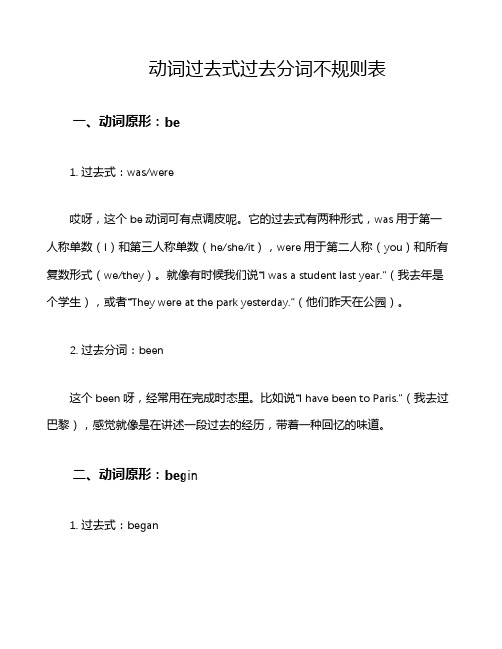
动词过去式过去分词不规则表一、动词原形:be1. 过去式:was/were哎呀,这个be动词可有点调皮呢。
它的过去式有两种形式,was用于第一人称单数(I)和第三人称单数(he/she/it),were用于第二人称(you)和所有复数形式(we/they)。
就像有时候我们说“I was a student last year.”(我去年是个学生),或者“They were at the park yesterday.”(他们昨天在公园)。
2. 过去分词:been这个been呀,经常用在完成时态里。
比如说“I have been to Paris.”(我去过巴黎),感觉就像是在讲述一段过去的经历,带着一种回忆的味道。
二、动词原形:begin1. 过去式:beganBegin变成began的时候,就像是故事开始有了新的起点。
比如“The movie began at seven o'clock.”(电影七点开始),一下子就把我们带到了那个电影开场的时刻。
2. 过去分词:begun当我们说“He has begun his new job.”(他已经开始了他的新工作),begun 就有一种已经开启新征程的感觉。
三、动词原形:bring1. 过去式:broughtBrought这个过去式可好用啦。
像“She brought some flowers to me.”(她给我带了一些花),就像是传递了一份美好的东西过来。
2. 过去分词:brought在句子“He has brought a lot of changes to the village.”(他给这个村庄带来了很多改变)里,brought强调了已经带来的结果。
四、动词原形:buy1. 过去式:bought每次说到bought就会想到购物。
“I bought a new dress yesterday.”(我昨天买了一条新裙子),感觉很有生活气息呢。
人教版英语不规则动词过去式 过去分词练习 带汉语
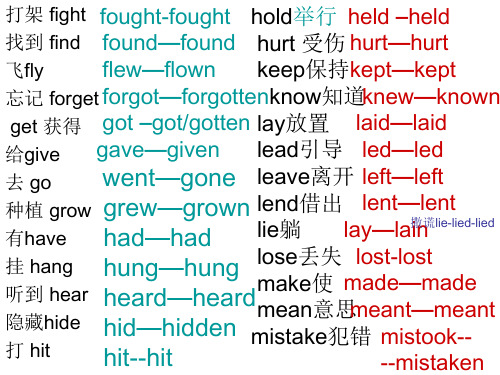
hhuenagrd——hhuenagrdlmmoseaeak丢en使意失思mmloaesdate-nl—ot—smt maedaent
hid—hidden mistake犯错 mistook--
hit--hit
--mistaken
• am /is was –been
come来 came—come
•出打成生败为arebbbeeeacaotr mewbbbeoeecrareeat———mbebbeo—earebtnneencomeccdouesta切tl花处费理
come cost cut deal dig do draw dream drink drive eat fall feel
• meet • pay • put • read • ride • ring • rise • run • say • see • sell • send • shine • shake • teach • think
hold hurt keep know lay lead leave lend lie躺 lose make mean mistake
撒谎lie-lied-lied
• am /is • are • bear • beat • become • begin • blow • break • bring • build • buy • catch • choose • wake • wear • write
打架 fight fought-fought hold举行 held –held
找到 find found—found hurt 受伤 hurt—hurt
飞fly
flew—flown keep保持kept—kept
忘记 forget forgot—forgottenknow知道knew—known
(完整版)英语动词变过去式、过去分词不规则变化大全

英语动词变过去式、过去分词不规则变化大全一般情况下,直接在动词后面加-ed不规则动词过去式【AAA型】:Cost cost cost 花费cut cut cut 切put put put 放read read read 读set set set 树立shut shut shut 关hit hit hit 撞hurt hurt hurt 伤害let let let让【ABB型】:(原形→aught/ought→aught/ought) catch caught caught赶上,抓住teach taught taught教bring brought brought带buy bought bought买think thought thought想(原形→元音变化→元音变化)sit sat sat坐meet met met遇到find found found发现get got got得到stand stood stood站understand understood understood理解win won won赢hold held held举办,持shine shone shone照dig dug dug挖hang(悬挂;绞死)-hung悬挂(hanged绞死)-hung(hanged) (原形→“…t”→“…t”)lose lost lost输,丢失build built built建立spill spilt spilt吐spoil spoilt spoilt溺爱send sent sent送,发送spend spent spent花费,度过smell smelt smelt闻feel felt felt感觉mean meant meant意思是learn learnt/learned learnt/learned学lend lent lent借出(原形→“…d”→“…d”)Hear heard heard听Make made made做have(has) had had有pay paid paid支付say said said说lay laid laid躺sell sold sold卖tell told told告诉,说(“ee/ea”→“e..t”→“e..t”)sleep slept slept睡觉sweep swept swept打扫keep kept kept保持leave left left离开,留下【ABC型】:(原形→变形→原形+en/ne)be(am,is) was been是be(are) were beensee saw seen看见do did done做go went gone走beat beat beaten击打eat ate eaten吃give gave given给hide hid hidden藏fall fell fallen掉下mistake mistook mistaken弄错;误解take took taken拿drive drove driven行驶rise rose risen上升;高地,出现ride rode ridden骑,乘坐write wrote written写(原形→“-o-”→“过去式-n”)break broke broken打碎,破解speak spoke spoken讲choose chose chosen选择forget forgot forgotten忘记freeze froze frozen结冰wake woke/waked woken/waked醒(原形→“ew”→“原形-n”)draw drew drawn画blow blew blown吹show showed shown领,展现fly flew flown飞grow grew grown成长throw threw thrown扔know knew known知道,了解(原形→“-a-”→“-u-”)Begin began begun开始ring rang rung打(电话)drink drank drunk喝sing sang sung唱sink sank/sunk sunk/sunken沉swim swam swum游泳【其他】lie lay lain说谎wear wore worn穿,戴着【ABA型】become became become成为come came come过来run ran run跑【AB型】(无过去分词)May might可能Must must必须can could能shall should应该will would将要动词第三人称单数变化规则如下:1) 一般情况下,动词后面直接加 -s. 例如: works gets says reads2) 以ch,sh,s,x 或 o 结尾的动词,在后面加 -es。
不规则动词过去式和过去分词及其练习
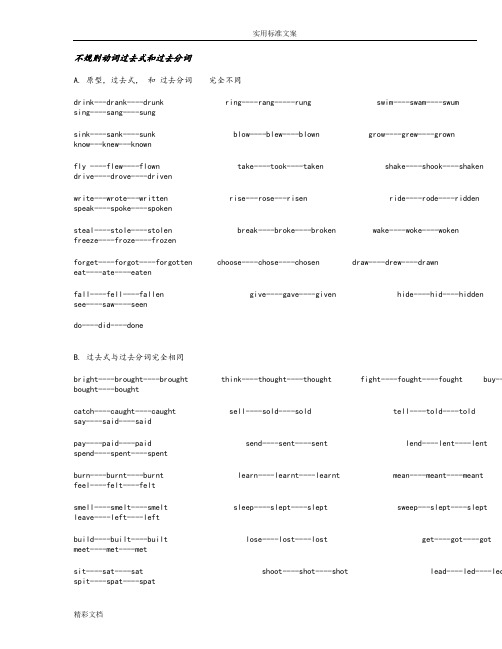
不规则动词过去式和过去分词A. 原型,过去式,和过去分词完全不同drink---drank----drunk ring----rang-----rung swim----swam----swum sing----sang----sungsink----sank----sunk blow----blew----blown grow----grew----grown know---knew---knownfly ----flew----flown take----took----taken shake----shook----shaken drive----drove----drivenwrite---wrote---written rise---rose---risen ride----rode----ridden speak----spoke----spokensteal----stole----stolen break----broke----broken wake----woke----woken freeze----froze----frozenforget----forgot----forgotten choose----chose----chosen draw----drew----drawn eat----ate----eatenfall----fell----fallen give----gave----given hide----hid----hidden see----saw----seendo----did----doneB. 过去式与过去分词完全相同bright----brought----brought think----thought----thought fight----fought----fought buy--bought----boughtcatch----caught----caught sell----sold----sold tell----told----told say----said----saidpay----paid----paid send----sent----sent lend----lent----lent spend----spent----spentburn----burnt----burnt learn----learnt----learnt mean----meant----meant feel----felt----feltsmell----smelt----smelt sleep----slept----slept sweep---slept----slept leave----left----leftbuild----built----built lose----lost----lost get----got----got meet----met----metsit----sat----sat shoot----shot----shot lead----led----led spit----spat----spathave----had----had hold----held----held make----made----made stand----stood---stoodhear----heard----heard find----found----found dig----dug----dug shine----shone----shoneunderstand----understood----understood win----won----wonC.原型与过去分词相同come----came----come run----ran----run become----became----becomeD.原形与过去式和过去分词完全相同cast----cast----cast cut----cut----cut put----put----put let-------let set----set----sethit----hit----hit shut----shut----shuthang----hung----hung 吊,挂 lie---lied---lied 说谎 lie---lay---躺下,位于,平放hanged----hanged 处绞刑--laid---laid 置放。
不规则动词过去式过去分词
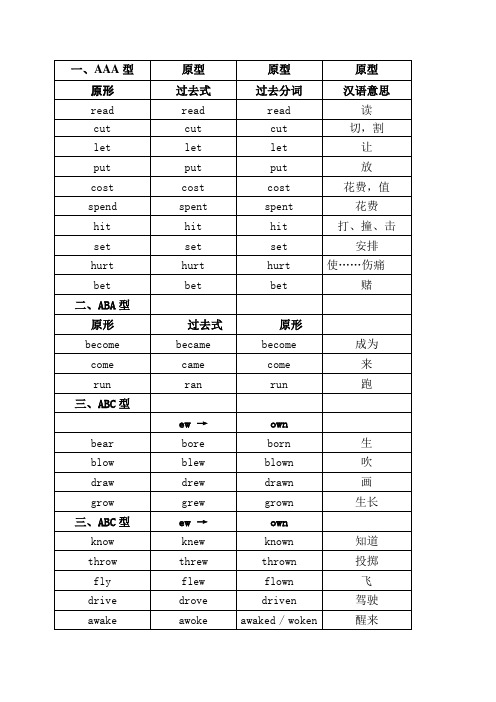
throw
threw
thrown
投掷
fly
flew
flown
飞
drive
drove
driven
驾驶
awake
awoke
awaked / woken
醒来
tear
tore
torn
撕裂
steal
stole
stolen
偷
shake
shook
shaken
摇
→
a→
u
原形
过去式
过去分词
汉语意思
begin
began
一、AAA型
原型
原型
原型
原形
过去式
过去分词
汉语意思
read
read
read
读
cut
cut
cut
切,割
let
let
let
让
put
put
put
放
cost
cost
cost
花费,值
spend
spent
spent
花费
hit
hit
hit
打、撞、击
set
set
set
安排
hurt
hurt
hurt
使……伤痛
bet
bet
learnt
学
lie
lay
lain
躺/位于/在于
lay
lain
lain
放、放置
lay
laid
laid
铺,放,下蛋
sink
sank
sunk
下沉
burn
初中英语常考不规则动词原型过去式过去分词归纳

初中英语常考不规则动词原型过去式过去分词归纳一、A—A—A型,即原形、过去式和过去分词三者都相同:cost—cost—costcut—cut—cuthit—hit—hithurt—hurt—hurtlet—let—letput—put—putread—read—readshut—shut—shutset—set—set二、A—B—B型,即过去式、过去分词相同:1.过去式和过去分词都含有-ought:bring—brought—broughtbuy—bought—boughtthink—thought—thought2.词尾有-ild,-end时,只需把d变为t:build—built—builtlend—lent—lentsend—sent—sentspend—spent—spent3.过去式、过去分词都含有-aught:catch—caught—caughtteach—taught—taught4.把-eep变为-ept:keep—kept—kept sleep—slept—slept sweep—swept—swept5.把-ell变为-old:tell—told—toldsell—sold—sold6.过去式、过去分词都含有-elt或-ilt:smell—smelt—smelt spell—spelt—speltfeel—felt—feltspill—spilt—spilt7.过去式、过去分词都在原形词尾加t:learn—learnt—learnt mean—meant—meant spoil—spoilt—spoilt8.过去式、过去分词词尾是d:say—said—saidpay—paid—paidlay—laid—laidhear—heard—heard9.改变元音字母:meet—met—metget—got—gotsit—sat—satfind—found—foundhold—held—heldspit—spat—spat shine—shone—shonewin—won—wonhang—hung—hungdig—dug—duglose—lost—lost10.改变辅音字母:make—made—made11.改变元、辅音字母:leave—left—leftstand—stood—stoodhave(has)—had—hadunderstand—understood—understood三、A—B—C型,即原形、过去式、过去分词都不相同:1.i—a—u变化:begin—began—begundrink—drank—drunksing—sang—sungring—rang—rungswim—swam—swumsink—sank—sunk2.词尾为-ow,-aw 时,过去式将其变为-ew,过去分词在其原形后加n:blow—blew—blowndraw—drew—drawnthrow—threw—thrown(show 除外)3.词尾为“i+辅(1个)+e”,过去式将i变为o,过去分词多在原形后加n,若那个辅音字母为d或t,须双写d或t后加n。
- 1、下载文档前请自行甄别文档内容的完整性,平台不提供额外的编辑、内容补充、找答案等附加服务。
- 2、"仅部分预览"的文档,不可在线预览部分如存在完整性等问题,可反馈申请退款(可完整预览的文档不适用该条件!)。
- 3、如文档侵犯您的权益,请联系客服反馈,我们会尽快为您处理(人工客服工作时间:9:00-18:30)。
不规则动词过去式和过去分词A. 原型,过去式,和过去分词完全不同drink---drank----drunk ring----rang-----rung swim----swam----swum sing----sang----sungsink----sank----sunk blow----blew----blown grow----grew----grown know---knew---knownfly ----flew----flown take----took----taken shake----shook----shaken drive----drove----driven,write---wrote---written rise---rose---risen ride----rode----ridden speak----spoke----spoken steal----stole----stolen break----broke----broken wake----woke----woken freeze----froze----frozen forget----forgot----forgotten choose----chose----chosen draw----drew----drawn eat----ate----eatenfall----fell----fallen give----gave----given hide----hid----hidden see----saw----seendo----did----done【B. 过去式与过去分词完全相同bright----brought----brought think----thought----thought fight----fought----fought buy----bought----bought catch----caught----caught sell----sold----sold tell----told----told say----said----saidpay----paid----paid send----sent----sent lend----lent----lent spend----spent----spent>burn----burnt----burnt learn----learnt----learnt mean----meant----meant feel----felt----feltsmell----smelt----smelt sleep----slept----slept sweep---slept----slept leave----left----leftbuild----built----built lose----lost----lost get----got----got meet----met----metsit----sat----sat shoot----shot----shot lead----led----led spit----spat----spathave----had----had hold----held----held make----made----made stand----stood---stood…hear----heard----heard find----found----found dig----dug----dug shine----shone----shone understand----understood----understood win----won----wonC.原型与过去分词相同come----came----come run----ran----run become----became----become…D.原形与过去式和过去分词完全相同cast----cast----cast cut----cut----cut put----put----put let----let----let set----set----sethit----hit----hit shut----shut----shuthang----hung----hung 吊,挂 lie---lied---lied 说谎 lie---lay---lain 躺下,位于,平放hanged----hanged 处绞刑 lay---laid---laid 置放。
-getting putting swimming running beginning digging getting sitting stopping一般现在时和一般过去时[.用be的适当形式填空1.This ____ a picture of a school, and that ____ a picture of a factory.2.These _____coats for men, and those _____ coats for women.3.It ____ sunny today, but it _____ rainy yesterday. I hope it ____ fine tomorrow.4.They ____ middle school students last year, but now they ____ college students.5.}6.I _____ a student of English, and my sister _____ a student of history.7.I ______ very glad to see you.8.She _____ often late for school9.On very cold winter days the lake _____ often covered with ice.10.Now some mummies _______ on show in some museums.<students _____ often busy with their homework.用have的适当形式填空man _____ a face and two hands, and a clock ____ a face and three hands.2.“They are free” means “ They _____ nothing to do .”Wang _____ neither a radio nor a TV set before but now he _____ both a radio and a TV set.【liberation, the working people _______ not enough to eat or wear, and many of them _____ no house to live in you a car No, but I _____ one last year.用动词的适当形式填空1.My brother usually _____ ( get up ) at six o’clock.2.%3.The earth ______( go ) round the sun.4.The cat _____ ( catch ) mice very well.5.My sister always ________ ( wash ) clothes for me.6.We ______ ( read ) English every morning.7.Kate _______ ( study ) Chinese harder than Peter.8.&9.They ______ ( do ) their homework carefully every day.10.Mary and Rose ________ ( see ) a film once a week.11.Japan _______ ( lie ) to the east of China.spring ______ ( come ), the trees _______ ( turn ) green.they _____ ( watch ) TV every Saturday evening*father _____ ( not have ) his lunch in the factory . He always has it at home.it _____ ( take ) you one hour to go to school every day___________ ( not like ) apples.<________ ( not study ) Russian. We study English.16. ______John ______ ( sing ) very well17. ______the baby ______ ( sing ) very well18. Her sister ________ ( not look ) like her mother.选择填空】(D)1. The Smiths usually _____ lunch at home.A. haven’tB. hasn’tC. hadn’tD. don’t have (A)2. “ You _____ a class meeting today” said the teacher.A. don’t haveB. didn’t haveC. doesn’t haveD. haven’t (C)3. How often _____ a football matchA. had youB. have youC. do you haveD. have you had·(C)4. Martin often _____ his model plane on Saturday afternoon.A. flyB. flysC. fliesD. is flying(B) little always ____ his hands before he ____ anything.A. was…eatB. washes…eatsC. washs…eatsD. washes…eates(B) usually _____ newspapers after supper.A. readB. readsC. is readingD. has read(A) Blacks often _____ to the cinema on Saturday evenings.@A. goB. goesC. have goneD. are going(A) _____ trees in spring every year.A. plantB. plantsC. are plantingD. have planted(B) _______to buy some medicine for his cough.A. wantB. wantsC. has wantedD. is wanting(A) Smith has been busy these days, He _____ tired and ______ a good rest.A. feels…needsB. has felt…has needed…C. feels…will needsD. is feeling…is needingA. wasB. isC. areD. were(A) the magazine I learned there ____ no air or water on the moon.A. isB. areC. wasD. were(B) farmer told his children that crops _______without water.A. aren’t livingB. can’t liveC. isn’t livingD. doesn’t live )(B) a child knows that Sunday _____after Saturday.A. comeB. comesC. is comingD. has come (A)’ll return the book to Jack if I_______ him tomorrow.A. seeB. will seeC. am going to seeD. saw (C) will do some shopping if she _______free this Sunday.A. is going to beB. will beC. isD. was"(D) Green will go to the meeting if she _____ better this afternoon.A. feelB. will feelC. can feelD. feels(C) I _____some tickets, I will give you one.A. has gotB. will getC. getD. gets^(B) will come to play with us as soon as he _____ writing the composition.A. finishedB. finishesC. will finishD. is finishing(A) students will wait here until their new teacher ______.A. comesB. will comeC. have comeD. is coming(D) won’t go to bed before she _____ “Good night” to her mother .A. sayB. had saidC. saidD. says(A) the meeting ____over , we will go to the dining-room.,A. isB. wasC. will beD. are(D) ___ at that school ten years ago.A. studyB. had studiedC. have studiedD. studied (D) policeman ______ the thief but found nothing in his pocket.A. has searchedB. will searchC. is searchingD. searched (C) baby _____ at his mother as soon as he saw her.A. smilesB. smileC. smiledD. had smiled】(C) did you do last Sunday I _____ the piano at home.A. am playingB. have playedC. playedD. plaid(D) young man got up very early that morning and _____ not to be late again.A. tryB. triesC. triedD. tried(B) car ______ and an old man with glasses came out.A. stopsB. stoppedC. stopedD. was stopping《(C) visitor _____that they would go to the Great Wall the next morning.A. hearB. hearsC. heardD. heared(B) policemen _____ the thief while he was sleeping.(B) teacher _____ a map on the blackboard before she gave the lesson.A. hangedB. hungC. hangD. hangs(D) _____ out a knife and _____ the paper into pieces.~A. bringed…cutB. braught…cuttedC. brought…cutedD. brought…cut(A) ____ from the tree and ____ the boy hard.A. fell...hit B. felt...hitted C. fallen...hitted D. falled (i)(A) ___ his car lostA. did Mr Smith findB. did Mr Smith foundC. Mr Smith foundD. were Mr Smith find (D) Black ____ anything at the shop that day.A. not boughtB. don’t buyC. doesn’t buyD. didn’t buy|(A) old man ____ off until the bus started.A. did not getB. has not gotC. will not getD. not got(D) teacher ____ what Peter had told her.A. not understoodB. understand notC. won’t understandD. didn’t understand(B) ____ at home yesterday afternoon.A. did not beB. was notC. were notD. am not~(A) ____ good at sports when she ____ a schoolgirl.A. wasn’t…wasB. didn’t…wasC. weren’t…isD. isn’t…was(A) Tom able to speak three languages when he ____ only ten years oldA. Was…wasB. did…wasC. does…isD. Is…was(A) ____ she late for school this morningA. wasB. didC. wereD. does'(B) people at the meeting _____ surprised at the news.A. areB. wereC. isD. did(C) the parents _____ pleased with their son’s homework, they asked him to do it again.A. not wereB. did notC. weren’tD. was not(C) a good time yesterday eveningA. Did John hasB. Did John hadC. Did John haveD. Had John had@(C) rained so hard yesterday that we _____ a good time in the park.A. had notB. have notC. didn’t haveD. don’t have(D) looks tired, ______ a rest at noonA. Had sheB. Had she hadC. does she haveD. did she have(A) policemen ____ into the house as soon as they got out of the car.A. rushedB. rushC. to rushD. rushing(D) ____ when you looked out of the window$A. have you seenB. were you seeingC. do you seeD. did you see(A) ____ well as his mother asked him to get up.A. didn’t feelB. doesn’t feelC. hadn’t feltD. wouldn’t felt(D) ____ the policemen as soon as he found the spy.(B) he ____ up, the man found it was already ten to eight.A. wakenB. wokeC. has wokenD. was waking】(A) students ____ more than five hundred English words last year.A. learnedB. have learnedC. had learntD. were learning(C) story ____ in a small mountain village.A. happenB. happensC. happenedD. has happened(A) Smith came in, sat down and ____ to write something on a piece of paper.A. beganB. beginedC. would beginD. was beginning<(C) man _____ on his coat and hat before he went out.A. puttedB. putsC. putD. was putting(A) old lady ____ at the young man when he was speaking at the meeting.A. lookedB. looksC. had lookedD. is looking(C) said she would be a doctor after she ____ up.A. growsB. growedC. grewD. would grow(B) boy said he would begin to work after he ____ middle school.、A. finishesB. finishedC. would finishD. has finished(A) said he would finish his homework before he ____ TV.A. watchedB. watchesC. would watchD. will watch(A) Green told us she would stay in China for a few months before she ____ for Japan.A. leftB. leavedC. leavesD. would leave,(B) told us that they were going to Australia if they ____ so busy the next month.A. aren’tB. weren’tC. wouldn’t beD. didn’t be(A) peasant said he was going to build a new house if he ____ enough money.A. hadB. would haveC. had hadD. was having(D) said in his letter that he would come to see me as soon as he ___ here.A. getsB. would getC. getD. got(D) Ping often _____ English in the morning, _____ he*A. read…doB. reads…doC. read…doesn’tD. reads…doesn’t (C) time ____ you _____ your homeworkA. does…doB. do…xC. do…doD. x…do(B)’ll give the book to Bob if he ______.A. comeB. comesC. will comeD. is coming(B) ____ some boys on the playground.A. isB. areC. haveD. has(B) will go to the zoo if it _____ tomorrow.A. won’t rainB. doesn’t rainC. don’t rainD. not rain(A) much rice _______ in the jarA. is thereB. are thereC. there isD. hasA. will leaveB. is leavingC. leaveD. leaves(B) _______wrong with my bike.A. are somethingB. is somethingC. have somethingD. has something(B) windows of our classroom _______once a week.A. is cleanedB. are cleanedC. was cleanedD. were cleaned(C) Tom _______to the radio every morningA. Does…listensB. Do …listenC. Does…listenD. Do…listens(B) ____ a friendly match with Class Three the other day.A. playB. playedC. have playedD. had played(C) ____ four English classes a week last term.A. hadB. haveC. hadD. have been(A) uncle ______ a poor life before liberation .A .lived B. had lived C. lives D/ has lived(B) father ______ in a factory when I was a child.A. worksB. workedC. is workingD. has worked(D) ____ you ______ to ChinaA. did…cameB. do …comeC. do…cameD. did…come(..。
